A Kiddush lunch is more than just a meal; it's a cherished Jewish tradition that combines delicious food with spiritual significance. It centers around the Kiddush, a blessing recited over wine, marking the sanctification of the Sabbath or a Jewish holiday. While often associated with Sabbath celebrations, Kiddush lunches can also be enjoyed on other special occasions, bringing family and friends together in joyous fellowship.
This article will explore everything you need to know about Kiddush lunches, answering frequently asked questions and delving into the rich cultural tapestry surrounding this beloved custom.
What is the Kiddush?
Before we delve into the specifics of a Kiddush lunch, let's understand the heart of the event: the Kiddush itself. The Kiddush is a blessing recited over a cup of wine (or grape juice) that sanctifies the Sabbath or a Jewish holiday. It's a pivotal moment, marking a transition into a time of spiritual elevation and celebration. The words of the blessing express gratitude to God for the creation of the world and the gift of the Sabbath or holiday.
What Does a Typical Kiddush Lunch Consist Of?
The menu for a Kiddush lunch is often bountiful and varies greatly depending on the occasion, the region, and the family's preferences. However, certain elements are common:
- Challah: This braided egg bread is a staple of the Sabbath and Jewish holidays, often served sliced and buttered.
- Other Breads: Various types of bread, rolls, and pastries might be included to offer diverse options.
- Salads: Fresh salads, often incorporating seasonal ingredients, provide a refreshing counterpoint to richer dishes.
- Main Courses: These can range from roasted meats (chicken, turkey, beef) to fish, or vegetarian options like vegetable casseroles or stuffed vegetables.
- Sides: A wide variety of side dishes are typical, including roasted potatoes, rice dishes, and various vegetable accompaniments.
- Desserts: Sweet treats such as cakes, cookies, pastries, and fruit are a must to conclude the meal on a sweet note.
The overall goal is to provide a satisfying and festive meal that caters to a variety of tastes and preferences, ensuring all guests feel welcomed and well-fed.
What is the Difference Between a Kiddush Lunch and a Regular Lunch?
The key difference lies in the context and intention. A regular lunch is simply a meal; a Kiddush lunch incorporates the sanctification of the Sabbath or holiday through the recitation of the Kiddush blessing over wine. This ritual elevates the meal from a simple act of nourishment to a sacred experience of gratitude and communal celebration. It’s about the combined experience of food, fellowship, and spiritual reflection.
What Occasions Call for a Kiddush Lunch?
While often associated with the Sabbath, Kiddush lunches are also common for various occasions, including:
- Jewish Holidays: Many Jewish holidays are celebrated with a Kiddush lunch, providing a festive atmosphere for family and friends to gather.
- Simchas (Joyful Occasions): Life cycle events like Bar/Bat Mitzvahs, weddings, and anniversaries often feature Kiddush lunches as part of the celebration.
- Special Gatherings: Any gathering where people wish to mark a special occasion or simply come together in a spirit of celebration can include a Kiddush lunch.
What are the Customs and Traditions Surrounding a Kiddush Lunch?
Beyond the meal itself, certain customs and traditions often accompany a Kiddush lunch:
- Blessings Before and After the Meal: Saying grace before and after the meal is a common practice, expressing gratitude for the food and the opportunity to share it together.
- Singing and Storytelling: Many Kiddush lunches involve singing traditional Jewish songs or sharing stories and memories, fostering a strong sense of community and connection.
- Family and Friends: The emphasis is always on community and togetherness. Kiddush lunches are opportunities to strengthen family bonds and connect with loved ones.
Is it Necessary to Have Wine for a Kiddush Lunch?
While traditionally wine is used for the Kiddush blessing, grape juice is a perfectly acceptable alternative, particularly for children or those who don't consume alcohol. The most important aspect is the recitation of the Kiddush blessing itself, which marks the sanctification of the day or occasion.
In conclusion, a Kiddush lunch is a rich and multifaceted tradition that seamlessly blends culinary delights with spiritual significance. It's a vibrant expression of Jewish culture, fostering community, and marking important occasions with delicious food and heartfelt celebrations. The precise details may vary, but the spirit of joy, gratitude, and shared experience remains constant.
